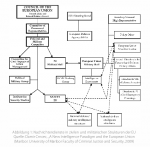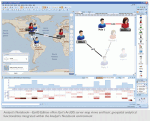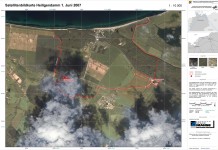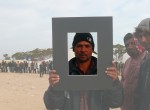Browse: Page 43
By europolice on 11. August 2011
Google has admitted complying with requests from US intelligence agencies for data stored in its European data centers, most likely in violation of European Union data protection laws.
Gordon Frazer, Microsoft UK’s managing director, made news headlines some weeks ago when he admitted that Microsoft can be compelled to share data with the US government regardless of where it is hosted in the world.
At the center of this problem is the USA PATRIOT ACT, which states that companies incorporated in the United States must hand over data administered by their foreign subsidiaries if requested.
Not only that, but they can be forced to keep quiet about it in order to avoid exposing active investigations and alert those targeted by the probes. (more on news.softpedia.com)
Posted in English, European Police, Software/ IT
By europolice on 10. August 2011
 We would like to invite you to the Security Research Conference 2011– the largest European conference on research for security, which will be held on:
We would like to invite you to the Security Research Conference 2011– the largest European conference on research for security, which will be held on:
19-21 September 2011 in Hilton Hotel in Warsaw, Poland
This year in the capital of Poland all the security stakeholders will meet for the sixth time. Policy makers, researchers, industry representatives and end users from all over Europe will talk about the current research capabilities as well as the legal, technological and organisational solutions for the greatest challenges facing public security today. Continue reading „Security Research Conference 2011“
Posted in Biometrie, Border Control, Crowd Control, English, European Police, Forschung, Kommunikation, Policing Major Events, Robotik, Software/ IT, Space
By europolice on 2. August 2011
 The Metropolitan Police have released an injunction to other police forces in the UK, together with businesses and other organisations, encouraging members of the public to ‚contact your local police force‘ and report on local anarchists. Predictably, anarchists nation-wide are angry at this advice which we believe to be a step towards criminalizing our beliefs.
The Metropolitan Police have released an injunction to other police forces in the UK, together with businesses and other organisations, encouraging members of the public to ‚contact your local police force‘ and report on local anarchists. Predictably, anarchists nation-wide are angry at this advice which we believe to be a step towards criminalizing our beliefs.
In a step that is reminiscent of the McCarthy era (which saw the imprisonment and harassment of thousands of American citizens) this is an unsurprising attempt by the State to clamp down on dissent in the nation. In the post second world war era socialism posed a significant threat to Western democracies with huge gains made by the socialist movement both in parliamentary space (such as in Britain under Clement Atlee) and extra-parliamentary space (such as in Cuba under Castro).
[It is worse. Much, much worse than that.] Continue reading „Report your local anarchist“
Posted in English, European Police |
By europolice on 2. August 2011
 I doubt many people have heard of Project Griffin. It is a joint initiative between the City of London Police and the Metropolitan Police, set up in 2004 and based at the City Police’s HQ, which has spread its network to police forces around the country and seeks to “advise and familiarise managers, security officers and employees of large public and private sector organisations across the capital on security, counter-terrorism and crime prevention issues”.
I doubt many people have heard of Project Griffin. It is a joint initiative between the City of London Police and the Metropolitan Police, set up in 2004 and based at the City Police’s HQ, which has spread its network to police forces around the country and seeks to “advise and familiarise managers, security officers and employees of large public and private sector organisations across the capital on security, counter-terrorism and crime prevention issues”.
Every week, Chief Inspector Nick Smith and his team at the ‘Westminster Counter Terrorism Focus Desk’, one of the Project Griffin projects, send out a briefing to businesses and this week’s edition includes the extraordinary advice opposite. Leaving aside the rather limited definition of ‘anarchism’, the suggestion that “any information relating to anarchists should be reported to your local Police” is another example of the attempted criminalisation of ideas.
For the time being, holding anarchist sympathies is not a crime – although presumably any gossip, however dubious and ill-informed, will be passed on by borough-level SO15 Counter Terrorism Liaison Officers to the feverish data collectors at the National Extremism Tactical Co-ordination Unit. Continue reading „Report your local anarchist“
Posted in English, European Police
By europolice on 30. Juli 2011
 In Hamburg ist es schöne Tradition, dass in der „Schanze“ zweimal pro Jahr ein Stadtteilfest stattfindet, das Schanzenfest. Das Schanzenfest besteht tagsüber aus den üblichen Crèpeständen und Belustigungsbuden; aber gegen Abend hat es sich in der Vergangenheit immer wieder in eine Straßenschlacht verwandelt.
In Hamburg ist es schöne Tradition, dass in der „Schanze“ zweimal pro Jahr ein Stadtteilfest stattfindet, das Schanzenfest. Das Schanzenfest besteht tagsüber aus den üblichen Crèpeständen und Belustigungsbuden; aber gegen Abend hat es sich in der Vergangenheit immer wieder in eine Straßenschlacht verwandelt.
Ab dem späten Nachmittag belauern sich in der Regel Einsatzkräfte der Polizei in voller Montur und schwarz vermummte Protestierer, bis dann irgendwann irgendwer dem jeweils anderen den Gefallen tut und eine falsche Bewegung macht, was dann den Anlass zur Aufnahme der Kampfhandlungen gibt. Zum Standardarsenal der Polizei gehören dabei auch leistungsstarke Wasserwerfer, die bereits am frühen Nachmittag an strategisch wichtigen Punkten publikumswirksam in Stellung gebracht werden.
Und anlässlich eines der letzten Schanzenfeste hat nun offenbar ein Vermummter eine leere Bierflasche gegen einen Wasserwerfer geworfen. Continue reading „Wer mit Wasser wirft, muss auch Flaschen aushalten“
Posted in Crowd Control, European Police, Justiz |
By europolice on 29. Juli 2011
 Oceans cover much of our planet and they are difficult to keep under surveillance, with the trafficking of people, unlicensed fishing and piracy adding to the problem. Satellites, however, can help keep the seas safe.
Oceans cover much of our planet and they are difficult to keep under surveillance, with the trafficking of people, unlicensed fishing and piracy adding to the problem. Satellites, however, can help keep the seas safe.
Satellite imagery can be used to locate and track vessels, monitor beaches and ports, and detect unlicensed fishing and illicit oil discharges. In addition, spaceborne receivers pick up identification messages transmitted by all large vessels.
However, not all maritime authorities can access information from satellites at present. Continue reading „Pooled satellite data for maritime surveillance on the horizon“
Posted in English, Space
By europolice on 29. Juli 2011
 by Daniel Mason
by Daniel Mason
The European Union should combat the increased violence of animal rights extremists by renewing a dialogue so that their views can be aired in a democratic way, a conference of law enforcement agencies has concluded.
Fifty-eight experts from the EU agencies Europol and Eurojust, meeting in The Hague last week, recommended that EU member states cooperate more closely to tackle the violence, which increasingly includes the use of improvised explosive devices and improvised incendiary devices.
Forensic evidence reveals similarities in the methods and devices used by campaigners in different countries – indicating that operations are organised on an international level. Continue reading „Rise in violence by animal rights extremists“
Posted in English, European Police
By europolice on 13. Juli 2011
 Bundeskriminalamt (BKA), Bundespolizei und Zoll ermitteln offen und verdeckt in sozialen Netzwerken wie Facebook, StudiVZ und Wer kennt Wen. Das geht aus der Antwort des Bundesinnenministeriums auf eine kleine Anfrage (PDF-Datei) der Linksfraktion im Bundestag hervor. Danach nutzen Beamte des BKA, der Bundespolizei und des Zollfahndungsdienstes die sozialen Netzwerken hauptsächlich zur Verdichtung bereits gewonnener Erkenntnisse. „Spezifische Organisationseinheiten“ mit besonders ausgebildeten Fahndern für soziale Netzwerke gebe es bislang nicht, auch kooperiere man nicht mit privaten Firmen als Ermittler in sozialen Netzwerken.
Bundeskriminalamt (BKA), Bundespolizei und Zoll ermitteln offen und verdeckt in sozialen Netzwerken wie Facebook, StudiVZ und Wer kennt Wen. Das geht aus der Antwort des Bundesinnenministeriums auf eine kleine Anfrage (PDF-Datei) der Linksfraktion im Bundestag hervor. Danach nutzen Beamte des BKA, der Bundespolizei und des Zollfahndungsdienstes die sozialen Netzwerken hauptsächlich zur Verdichtung bereits gewonnener Erkenntnisse. „Spezifische Organisationseinheiten“ mit besonders ausgebildeten Fahndern für soziale Netzwerke gebe es bislang nicht, auch kooperiere man nicht mit privaten Firmen als Ermittler in sozialen Netzwerken.
Die Behörden nutzten fallbezogen offen zugängliche Informationen aus sozialen Netzwerken, heißt es weiter in der heise online vorliegenden, demnächst zur Veröffentlichung anstehenden Antwort, die das Ministerium im Auftrag der Bundesregierung abgegeben hat. (weiter auf heise.de)
Posted in BKA, Datenbanken, European Police, Software/ IT
By europolice on 13. Juli 2011
 Massive reshuffle and the removal of officers accused of killing protesters is just the tip of problems engulfing the ministry as it battles with the prime minister and itself over reform
Massive reshuffle and the removal of officers accused of killing protesters is just the tip of problems engulfing the ministry as it battles with the prime minister and itself over reform
Ahmed Eleiba
The Egyptian Ministry of Interior today implemented the largest reshuffle of its officers since the outbreak of January 25 Revolution.
Most significantly, Major-General Magdy Abdel-Ghaffar, former vice president of the now dismantled State Security Intelligence, succeeded Major-General Hamid Abdullah, first assistant secretary of the ministry, to the newly formed National Security Administration, who has reached retirement age.
A senior high level source from the ministry told us that the ministry has not yet announced the name of the new minister of interior to succeed Mansour El-Essawi, who is almost certain to leave his post in the cabinet reshuffle that Prime Minister Essam Sharaf is expected to implement in the next few days . Continue reading „State of insecurity at Egypt’s Ministry of Interior“
Posted in English, European Police
By europolice on 11. Juli 2011
 On 4 and 6 June 2011 the main Dutch rightwing daily De Telegraaf published two page long articles about the Dutch activist Paul Kraaijer based on an interview with him that took place in Curacao (Antilles). Kraaijer lives since about a year in Surinam. In these articles Kraaijer claimed to have been a long time informer for Dutch police intelligence and the internal security service AIVD (formerly known as BVD).
On 4 and 6 June 2011 the main Dutch rightwing daily De Telegraaf published two page long articles about the Dutch activist Paul Kraaijer based on an interview with him that took place in Curacao (Antilles). Kraaijer lives since about a year in Surinam. In these articles Kraaijer claimed to have been a long time informer for Dutch police intelligence and the internal security service AIVD (formerly known as BVD).
The main facts as presented in the articles were the following:
In 1986 Kraaijer was working as an acting clerk at the court of justice in Zwolle. In his free time he played darts in a local pub that was also frequented by some criminals. He talked about this with a colleague at work. An officer of the Regional Intelligence Service (RID) of the Zwolle who was present by chance, approached him thereupon. He turned out to know the father of K and asked K. to collect information about a specific criminal at the pub against whom there was an arrest warrant and who was considered as armed and dangerous. Later he was also asked to inform about the local antimilitarist movement.
At the request of the RID, K. started to participate in the weekly demonstration at the US nuclear base at Darp near Havelte. One of the other participants was the famous ex-chaplain activist Kees Koning.
In 1990 K. came into contact with a young activist who wanted to occupy a crane in Mannheim that was being used to load ships with American war materials for the Gulf War. Apparently this action never took place. Continue reading „A perfect mole?“
Posted in English, European Police, Secret Service
By europolice on 11. Juli 2011
 Im folgenden geben wir eine kurze Einfuehrung zum Widerstand gegen die geplante Schnellbahntrasse Lyon-Torino, die den längsten Eisenbahntunnel Europas im Val de Susa vorsieht. Genauer wird auf die Demo und Aktionen vom 3.7.2011 eingegangen, als eine Massenmobilisierung versuchte, die Baustelle zu stürmen und die Bauarbeiten zu beenden. Es handelt sich größtenteils um eine Übersetzung französischer Indymedia-Artikel
Im folgenden geben wir eine kurze Einfuehrung zum Widerstand gegen die geplante Schnellbahntrasse Lyon-Torino, die den längsten Eisenbahntunnel Europas im Val de Susa vorsieht. Genauer wird auf die Demo und Aktionen vom 3.7.2011 eingegangen, als eine Massenmobilisierung versuchte, die Baustelle zu stürmen und die Bauarbeiten zu beenden. Es handelt sich größtenteils um eine Übersetzung französischer Indymedia-Artikel
NO TAV – VAL DE SUSA
Aus dem französisch übersetzter Bericht(+ gekennzeichnete Anmerkungen der ÜbersetzerInnen) über die No TAV Bewegung der letzten Jahrzehnte und dem aktuellen Widerstand
Der Schnellzug Lyon-Turin (TAV) ist ein Alpen querendes Bahnprojekt, für das unter anderem der längste Bahntunnel Europas (mehr als 50 km) durch mineralreiches Gestein (u.a Uran) getrieben werden soll. Auf italienischer Seite soll der Tunnel im Val de Susa enden, wo auch einige der Millionen Kubikmeter Abraum abgelagert werden sollen. Die geschätzte Bausumme für das seit 2001 geplante Projekt übersteigt 25 Milliarden Euro. Ursprünglich als reine Schnellzug-Trasse geplant, sollen nun auch LKW-Transporte auf der Trasse getätigt werden. Aus diesem Grunde unterstützen auch französische Grüne das Projekt – obwohl französische TAV-Gegner_innen alternative Konzepte ohne Großprojekt vorgestellt haben. Continue reading „NO TAV – Val de Susa gegen Schnellbahntunnel“
Posted in Various
By europolice on 11. Juli 2011
 Mit den Razzien vom 19.02., 12.04. und 02.05. 2011 und die großangelegten Handy-Überwachungsmaßnahmen um den 19. Februar fand die Repressionswelle gegen linke Politik in Dresden einen vorläufigen Höhepunkt. Und verdeutlicht die Dimension der Aggressivität, mit der emanzipatorische Bestrebungen verstärkt konfrontiert werden- europaweit.
Mit den Razzien vom 19.02., 12.04. und 02.05. 2011 und die großangelegten Handy-Überwachungsmaßnahmen um den 19. Februar fand die Repressionswelle gegen linke Politik in Dresden einen vorläufigen Höhepunkt. Und verdeutlicht die Dimension der Aggressivität, mit der emanzipatorische Bestrebungen verstärkt konfrontiert werden- europaweit.
Seit dem Aufkommen der Extremismus-Debatte wird der Versuch intensiviert, eine bürgerliche Mitte zu konstruieren, die von „extremistischen Rändern“ bedroht wird.
Die konservativen Sozialwissenschaftler Eckhart Jesse und Uwe Backes liefern neben anderen die theoretische Grundlage dafür(1). In pseudo-wissenschaftlichen „Erkenntnissen“ werden u.a. radikale Linke und Nazis als gleichermaßen gefährlich wie bekämpfenswert betrachtet. Als politisches Instrument diskreditiert und delegitimiert die so genannte „Extremismustheorie“ vor allem linke Positionen und Handlungen und verharmlost rechte Aktivitäten.
In diesem Zusammenhang wurde von der Bundesfamilienministerin Kristina Schröder (CDU) Anfang 2011 die so genannte „Extremismusklausel“ eingeführt, wonach zivilgesellschaftliche Initiativen, die bestimmte staatliche Förderungen erhalten wollen, auf ihre Verfassungstreue geprüft werden sollen. Continue reading „Repression auf mehreren Ebenen“
Posted in BKA, Border Control, Datenbanken, European Police, Europol, Kommunikation, Policing Major Events, Software/ IT
By europolice on 11. Juli 2011
 Proteste relativ offen über Facebook zu organisieren, ist in vielen Ländern derzeit üblich. Viele Teilnehmer der Protestaktion „Willkommen in Palästina“ wurden so vom israelischen Außenministerium erkannt und abgewiesen. „Wir brauchten den Mossad nicht. Es war alles ganz offen zu finden“, sagte ein Sprecher.
Proteste relativ offen über Facebook zu organisieren, ist in vielen Ländern derzeit üblich. Viele Teilnehmer der Protestaktion „Willkommen in Palästina“ wurden so vom israelischen Außenministerium erkannt und abgewiesen. „Wir brauchten den Mossad nicht. Es war alles ganz offen zu finden“, sagte ein Sprecher.
Israelische Behörden haben Facebook genutzt, um eine Protestaktion von Friedensaktivisten und Palästina-Solidaritätsgruppen zu verhindern. Das berichtet die Nachrichtenagentur AP. Israel hatte über soziale Netzwerke und Websites eine Liste von über 300 Namen zusammengestellt, die den Fluggesellschaften übermittelt wurden. Yigal Palmor, ein Sprecher des Außenministeriums, sagte, die Namen auf der Liste wurden zusammengestellt, indem einfach die Vorbereitung der Organisatoren in sozialen Netzwerken und auf Websites verfolgt wurde. Continue reading „Israel nutzt Facebook für Einreiseverbote“
Posted in European Police, Software/ IT
By europolice on 10. Juli 2011
 Bad Bramstedt: Seit Juni 2010 besteht eine Kooperationsvereinbarung zwischen dem Deutschen Zentrum für Luft- und Raumfahrt (DLR) und der Bundespolizei See (BPOL See). Mit Hilfe des Erdbeobachtungssatelliten TerraSAR-X detektiert das DLR Schiffe und erstellt Karten mit Schiffsinformationen. Diese Informationen benötigt auch die BPOL See zur Überwachung der Nord- und Ostsee. Bodo Kaping, Leiter der Bundespolizei See, und Polizeihauptkommissar Olaf Juhl, der als Verantwortlicher bei der Bundespolizei See die Kampagnen mit dem DLR leitet, sprechen über die Zusammenarbeit.
Bad Bramstedt: Seit Juni 2010 besteht eine Kooperationsvereinbarung zwischen dem Deutschen Zentrum für Luft- und Raumfahrt (DLR) und der Bundespolizei See (BPOL See). Mit Hilfe des Erdbeobachtungssatelliten TerraSAR-X detektiert das DLR Schiffe und erstellt Karten mit Schiffsinformationen. Diese Informationen benötigt auch die BPOL See zur Überwachung der Nord- und Ostsee. Bodo Kaping, Leiter der Bundespolizei See, und Polizeihauptkommissar Olaf Juhl, der als Verantwortlicher bei der Bundespolizei See die Kampagnen mit dem DLR leitet, sprechen über die Zusammenarbeit.
Herr Kaping, eine engere Zusammenarbeit zwischen dem DLR und der Bundespolizei See kam schon im ESA-Projekt MARISS zustande. Worum geht es bei MARISS?
Kaping: MARISS steht für MARItime Security Service und hat das Ziel, im Rahmen des Global Monitoring for Environment and Security (GMES) den Aufbau von nachhaltigen europäischen maritimen Sicherheitsdiensten zu wahren und vorzubereiten. Hier werden dann die wichtigen Anforderungen der nationalen und lokalen europäischen Nutzer berücksichtigt. Unterschiedliche Systeme und Daten aus verschiedenen Bereichen werden generiert und zusammengeführt – zum Beispiel Erdbeobachtungsdaten oder küsten- und satellitengestützte AIS-Signale. Continue reading „DLR: Wir wollen das Meer sicherer machen…“
Posted in European Police, Space
By europolice on 9. Juli 2011
 The clashes in Cairo on June 28 and 29, 2011, between police and protesters in which more than 1,000 people were injured highlight the urgent need to reform security forces, Human Rights Watch said. The government should promptly formulate an interim code of conduct for policing demonstrations and order a thorough investigation into any improper use of firearms and riot control weapons by the riot police during the protests.
The clashes in Cairo on June 28 and 29, 2011, between police and protesters in which more than 1,000 people were injured highlight the urgent need to reform security forces, Human Rights Watch said. The government should promptly formulate an interim code of conduct for policing demonstrations and order a thorough investigation into any improper use of firearms and riot control weapons by the riot police during the protests.
“The video footage of Central Security officers throwing stones back at protesters and firing teargas recklessly is ample evidence of the need for police to follow basic international standards,” said Joe Stork, deputy Middle East and North Africa director at Human Rights Watch. “With more demonstrations expected on July 8, the government needs to act quickly to prevent more mayhem and injury.”
The Central Security Forces (CSF), Egypt’s riot police, has a well-documented history of using excessive force against peaceful demonstrators as well as of shooting unarmed migrants on the Sinai border. Continue reading „Cairo Violence Highlights Need To Reform Riot Police“
Posted in English, European Police
By europolice on 8. Juli 2011
 Die Funkzellenauswertung anlässlich der Proteste gegen rechtes Gedenken in Dresden scheint uferlos – immer neue Details kommen ans Licht und reihen sich in zahlreiche andere Maßnahmen zur Ausforschung linken Protests ein. Doch schon vor sechs Jahren hatte die Generalbundesanwaltschaft (GBA) mehrere Beschlüsse zur Herausgabe von Funkzellendaten erwirkt, die sich über mehrere Tage hinzogen und innerhalb von mehreren Monaten stattfanden. Die genaue Zahl Überwachter bleibt bislang ungewiss – eine der überwachten Funkzellen befindet sich am Bahnhof Hamburg-Dammtor an der Bahnstrecke Berlin – Hamburg.
Die Funkzellenauswertung anlässlich der Proteste gegen rechtes Gedenken in Dresden scheint uferlos – immer neue Details kommen ans Licht und reihen sich in zahlreiche andere Maßnahmen zur Ausforschung linken Protests ein. Doch schon vor sechs Jahren hatte die Generalbundesanwaltschaft (GBA) mehrere Beschlüsse zur Herausgabe von Funkzellendaten erwirkt, die sich über mehrere Tage hinzogen und innerhalb von mehreren Monaten stattfanden. Die genaue Zahl Überwachter bleibt bislang ungewiss – eine der überwachten Funkzellen befindet sich am Bahnhof Hamburg-Dammtor an der Bahnstrecke Berlin – Hamburg.
Grundlage der umfangreichen Ermittlungen waren zwei Verfahren, mittels derer die gesamte Anti-G8-Bewegung seit 2005 ausgeforscht werden sollte: Behauptet wurde hierfür die Existenz zweier terroristischer Zusammenschlüsse, die fortan nach §129a StPO verfolgt werden konnten und damit die Kompetenzen der beteiligten Behörden sofort beträchtlich erweiterten – durchaus ein üblicher Behelf zur Kriminalisierung von Protest. Zu diesem Zeitpunkt zeichnete sich bereits ab, dass der Widerstand gegen den zwei Jahre später stattfindenden G8-Gipfel nicht nur beträchtlich groß ausfallen würde, sondern ebenso dass die breit aufgestellte Bewegung sich nicht spalten lassen wollte. Continue reading „Die polizeiliche Datenbankgesellschaft“
Posted in BKA, Datenbanken, European Police, Policing Major Events, Software/ IT
By europolice on 8. Juli 2011
 Ständige Konferenz der Innenminister und -senatoren der Länder
Ständige Konferenz der Innenminister und -senatoren der Länder
– Geschäftsstelle – Berlin, 01.07.2011
Beschlussniederschrift über die 192. Sitzung der Ständigen Konferenz der Innenminister und -senatoren der Länder am 21. / 22. Juni 2011 in Frankfurt
Download: http://euro-police.noblogs.org/files/2011/07/IMK_192.pdf
Posted in BKA, Border Control, Crowd Control, Datenbanken, European Police, Europol, Justiz, Kommunikation, Policing Major Events, Software/ IT
By europolice on 7. Juli 2011
 last update: July 2011
last update: July 2011
The following information is intended to help people who do not wish, or are unable, to return to their country of origin or another country, to prevent their deportation while still at the airport. If you can, inform your friends that you want to resist the deportation. They can support you from outside by speaking to the airline and informing them that you will not fly voluntarily. At Frankfurt Airport (where most deportations in Germany take place) there is a group who go to the airport in these cases, to inform passengers and airlines and to protest against your deportation.
You can contact this group by email: abschiebungverhindernffm(at)lists.riseup.net
The following information is about what you can do yourself to prevent your deportation, and applies primarily to deportations that take place in normal passenger aircraft. Currently, Roma people in particular are often deported using charter flights (mostly from Düsseldorf or Baden-Baden). In these cases it is much harder to defend yourself, as in these planes all of the other passengers are other deportees and police officers, so there are no witnesses. Nevertheless, this still applies: the more people that know that you are flying against your will, the greater the chance of preventing your deportation. There are also people active in Düsseldorf und Baden-Baden, who protest against deportations. Continue reading „Information for people who want to defend themselves against their deportation“
Posted in Border Control, English, Was tun?
By europolice on 7. Juli 2011
 Traductions : [français] [italiano] [English] [Español] [عربي]
Traductions : [français] [italiano] [English] [Español] [عربي]
Seit Beginn der Krise in Libyen im Februar 2010 sind mehrere hunderttausend Menschen von dort geflohen. Am 14. Juni hat die Internationale Organisation für Migration (IOM) eine Million Flüchtlinge gezählt, die Libyen verlassen haben, davon 500.000 nach Tunesien, mehr als 300.000 nach Ägypten und 70.000 nach Niger.
Jeden Tag kommen Flüchtlinge an in Tunesien, um in bereits überfüllten Lagern zu landen [1]. Mehrheitlich kommen sie aus Ländern aus Subsahara-Afrika, in denen es Konflikte gibt, wie Somalia, Sudan, Eritrea oder der Elfenbeinküste und können nicht dorthin zurück gebracht werden. Sie leben unter immer schwierigeren Bedingungen, zu denen das zunehmende Risiko der Destabilisierung des Landes, das sie aufgenommen hat, hinzukommt.
Diese Flüchtlinge sitzen zwischen allen Fronten : Das Regime Gaddafis instrumentalisiert die Migrationsfrage, indem es Tausende von Menschen auf seeuntüchtige Boote zwingt, während zahlreiche Afrikaner, die verdächtigt werden, Söldner der Regierung von Tripoli zu sein, Opfer von Angriffen von Seiten der Rebellen des CNT (Nationaler Übergangsrat) sind [2]. Die Staaten der Koalition scheinen andererseits keine Verbindung herzustellen zwischen ihrer Militärintervention und der Flucht dieser Menschen. Die Europäische Union hat immer noch keine Initiative ergriffen, um sie aufzunehmen [3] oder diejenigen zu retten, die auf dem Meer in Not geraten. Im Gegenteil, sie verstärkt die Überwachung ihrer Grenzen, indem sie die Grenzschutzagentur Frontex einsetzt, und die Schiffe der Koalition leisten boat people keinerlei Hilfe. Continue reading „Eine Flottille, um das Blutbad im Mittelmeer zu beenden“
Posted in Border Control, Was tun?
By europolice on 7. Juli 2011
 By Colette Davidson and Courtney Traub
By Colette Davidson and Courtney Traub
French police have cracked down on Tunisian migrants who have come to this country since the revolution that ousted president Zine el-Abidine Ben Ali. A group of squatters were flushed out of a Paris gym on Tuesday and the city council says that, thanks to government cuts, their situation is set to get worse.
Maamri is 30-years-old and has been living homeless in Paris for the past six months. On Tuesday night, he was looking for a garden to sleep in after finding his temporary home at a gymnasium in the north-east of the city, closed and blocked off by more than 100 CRS riot police.
“Today, I came back after looking for a job to take a shower, as usual, and to take my things, my bag, my medication, and there was a police officer who told me ‘get out of here and shut your mouth’ before pushing me … I don’t know what I’m going to do … where I’ll go to sleep,” he says. Continue reading „Riot police clear Tunisians from Paris gym as government cuts aid“
Posted in Border Control, English, European Police

















